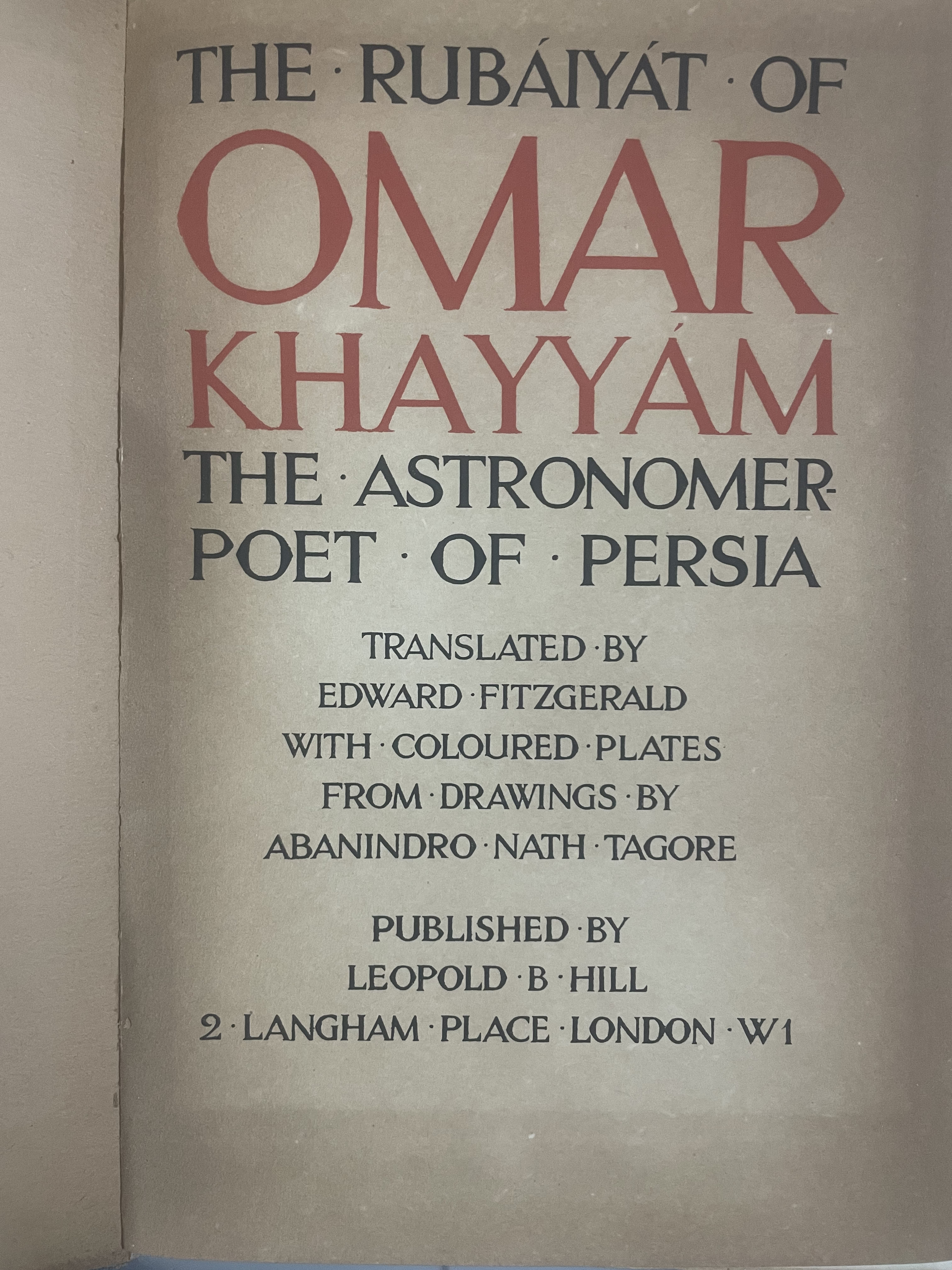Rubayat of Omar Khyam Rendered into English verse by Edward Fitzgerald

About
Summary
Exquisite
TOC
Details
Related
URL
Images
Overview
The Rubaiyat of Omar Khayyam, as rendered into English verse by Edward Fitzgerald, is a collection of رباعی (rubāʿiyāt), or quatrains, originally written by the 12th-century Persian mathematician, astronomer, and philosopher Omar Khayyam. Fitzgerald's translation, while not always literal, is celebrated for its artistic interpretation and has gained more prominence than the original Persian verses. The work explores themes of transience, fate, free will, and the pursuit of pleasure, inviting readers to reflect on the fleeting nature of existence and the complexities of human experience.The Rubaiyat begins at dawn on the Persian New Year, a time of renewal and reflection. The poem introduces a narrator who questions traditional beliefs and indulges in wine as a means of coping with life's uncertainties. Edward Fitzgerald compiled individual quatrains, originally meant to stand alone, to create an epic poem centered on carpe diem, or seizing the day. The poem suggests that focusing on the present and enjoying one's time is the only true certainty, as the past and future are shrouded in mystery.
The narrator in The Rubaiyat defies the conventions of an 11th-century Muslim, a period known for learning, science, and religious ritual. Instead, the poem depicts a character who embraces wine and rejects traditional learning and religious practices, viewing fate as unchangeable and attempts to alter one's life as futile. Despite this seemingly bleak outlook, the poem can be humorous, with wine symbolizing a solution to life's problems and a means of drawing closer to God. The inevitability of death is a recurring theme.
Fitzgerald's compilation of the quatrains presents a character who is seemingly depressed by the futility of life. The audience is urged to live in the moment, as dwelling on anything else would only lead to further despair. Although the poem acknowledges that no one can escape death, it still manages to be an uplifting tale of hedonistic pleasures and carelessness.
Importance of Book
Fitzgerald's Rubaiyat is celebrated as a masterpiece of translation and has had a lasting impact on Western literature. Its themes of transience, fate, and the pursuit of pleasure continue to resonate with readers today. The poem's popularity has led to debates about the correct interpretation of its philosophy, with some emphasizing Khayyam's skepticism and others highlighting the mystical elements in his work. Despite these debates, The Rubaiyat remains a testament to the power of poetry to explore complex philosophical questions and capture the essence of the human experience.
Key Themes
Transience: The Rubaiyat underscores the irreversible march of time and the finality of each moment. It reminds readers of life's fleeting nature and urges an appreciation of the present. Khayyam juxtaposes moments of pleasure and sorrow, viewing both as transient states in the grand tapestry of life, prompting readers to embrace both.
Fate vs. Free Will: The poem delves into the intricate relationship between fate and free will, exploring how these forces shape our experiences and choices. Khayyam questions the notion of a rigidly predetermined fate, challenging the idea that human life is entirely scripted by a higher power. He suggests that while some may believe their lives are molded by external hands, there remains a possibility for reshaping and changing the course of their own destinies. Khayyam reconciles fate with free will by embracing fate as an element of the human condition while advocating for the exercise of one's will.
Carpe Diem: The poem emphasizes the importance of living in the present moment and making the most of each fleeting opportunity. This theme encourages readers to pursue pleasure and self-determined joy, even in the face of life's inevitable sorrows.
Skepticism: Fitzgerald emphasized the religious skepticism he found in Omar Khayyam. Khayyam's philosophy is described as Epicurean, with Khayyam being critical of the Sufis.
Cultural Significance
Omar Khayyam was a renowned 12th-century Persian mathematician, astronomer, and philosopher. The Rubaiyat reflects the cultural and intellectual climate of its time, blending elements of science, philosophy, and poetry.
Effects on Society
The Rubaiyat has had a limited effect on Persian society. However, in the West, Fitzgerald's translation gained immense popularity and influenced Victorian society. Its themes of questioning authority, embracing pleasure, and contemplating mortality resonated with readers grappling with the changing social and intellectual landscape of the time. The poem's message of living in the moment and finding joy in earthly pleasures offered an alternative to traditional religious and societal norms.
Title
Rubayat of Omar Khyam Rendered into English verse by Edward Fitzgerald
Author
Rene Bull
Name of Publisher
Hodder & Stoughton London
Publish Date
1913
Subject
Fitzgerald?s translation of Omar Khayyam?s quatrains (rubaiyat)
Vintage
1901-1947
Category
Literary
Sub Category
Poetry
Rarity
RARE
